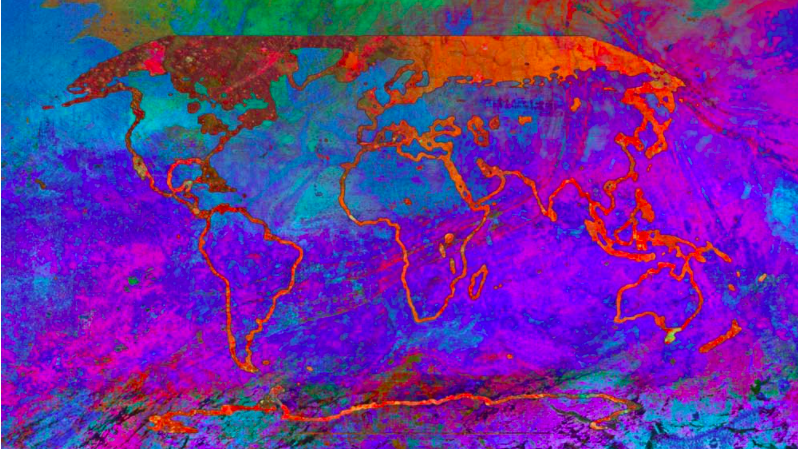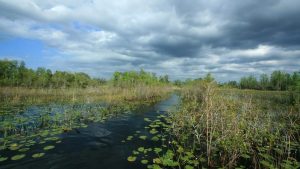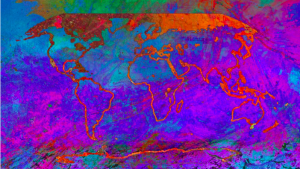Summer 2021 Newsletter

Summer 2021 Newsletter
Welcome to the Southeast Climate Adaptation Science Center’s Summer 2021 Newsletter.
For news and upcoming events related to the Southeast Climate Adaptation Science Center,
subscribe to our monthly newsletter.
SE CASC News | Resources | Publications | Tribal News | Partner News | Webinars | Events | Opportunities

Southeast Climate Adaptation Science Center News

The Southeast CASC is seeking a USGS Tribal Climate Strategies Research Scholar and USGS Postdoctoral Fellow in Climate Impacts to join our team. The deadline for these positions has been extended to September 15. Learn more.
Join us on September 16 for a Science Seminar co-sponsored by the South Atlantic Blueprint Team. Dr. Michelle Moorman presents Will the Marsh Stay or Will It Go? Coastal Wetland Transformations in the South Atlantic Basin. Learn more.
Graduate students from SE CASC Consortium Universities gave lightning presentations of Case Studies of Ecosystem Services Mapping in the Southeast in our July 20 Science Seminar. View the recording.
SE CASC Assistant University Director Aranzazu Lascurain was quoted in the Columbia News article, What is Needed for Fair and Equitable Managed Retreat? – Managed Retreat.
USGS Deputy Director Ryan Boyles and SE CASC Program Manager Cari Furiness helped develop the new Southeast Region section of the U.S. Climate Resilience Toolkit.
Congratulations to SE CASC Research Ecologist Adam Terando, named Federal Coordinating Lead of the Earth System Processes Chapter of the Fifth National Climate Assessment.
SE CASC Research Ecologist Mitch Eaton and 2013-14 Global Change Fellow Michael Just are co-authors to Structured Decision Making and Optimal Bird Monitoring in the Northern Gulf of Mexico.
Our cohort of 2020-21 Global Change Fellows have created science expert videos in which they interviewed leading scientists about pressing global change topics. Watch here.
Explore our newly initiated FY21 science projects Clarifying Science Needs for Determining the Impact of Climate Change on Harmful Algal Blooms in the Southeastern United States and Assessing the Climate Vulnerability of Wild Turkeys Across the Southeastern US.
SE CASC Researcher Mike Osland is co-author to The Distribution and Structure of Mangroves (Avicennia germinans and Rhizophora mangle) Near a Rapidly Changing Range Limit in the Northeastern Gulf of Mexico funded by SE CASC project, Identifying the Ecological and Management Implications of Mangrove Migration in the Northern Gulf of Mexico.
2018-19 Global Change Fellow Dol Raj Chalise is lead author and Faculty Affiliate Sankar Arumugam is co-author of Tropical Cyclones’ Contribution to Seasonal Precipitation and Streamflow Over the Southeastern and Southcentral United States.
SE CASC PI Erin Seekamp and Researcher Xiao Xiao co-authored a new publication, Climate adaptation planning for cultural heritages in coastal tourism destinations: A multi-objective optimization approach, funded by the SE CASC project, Protecting Cultural Resources in the Face of Climate Change. Learn more.
SE CASC Researchers Rob Dunn, Lauren Nichols, Clint Penick published The toughest animals of the Earth versus global warming: Effects of long-term experimental warming on tardigrade community structure of a temperate deciduous forest, supported by SE CASC project, Forests of the Future: Integrated Assessment of Climate Change and Ecosystem Diversity.
Spring 2018 Global Change Fellow Jared Balik was lead author and Faculty Affiliate Brad Taylor co-authored High-discharge disturbance does not alter the seasonal trajectory of nutrient uptake in a montane stream.
SE CASC Research Ecologist Adam Terando and Faculty Affiliate Jaime Collazo are co-authors to Climate change is creating a mismatch between protected areas and suitable habitats for frogs and birds in Puerto Rico.
Research by SE CASC Faculty Affiliate Erin Seekamp was highlighted by NC State News in Seeking Inclusive Strategies To Help Coastal Communities Adjust, Plan for Sea-Level Rise.
Project by SE CASC Researchers Georgina Sanchez and Ross Meentemeyer and Research Ecologist Adam Terando was featured by NC Sea Grant in Mapping the Future: Climate Change and Flooding in Coastal North Carolina.
SE CASC Faculty Affiliate, Kathie Dello was quoted in the article Summer swelter trend: West gets hotter days, East hot nights.
SE CASC Faculty Affiliate Jordan Kern was interviewed by NPR on the connection between drought, water levels and the power grid in the United States. Learn more.
We bid farewell to our former University Director, Derek Aday as we look forward to working with our Interim University Director, Dr. Rebecca Irwin.
Conservation Corridor: Ocean connectivity and rising atmospheric carbon dioxide.
Resources
FEATURED RESOURCE

The Intergovernmental Panel on Climate Change has released the first part of the sixth assessment report (AR6). This report summarizes the most up-to-date understanding of the physical climate system and climate change. The report can be explored through an interactive atlas, regional fact sheets, and a technical summary, in addition to the full report and a summary for policymakers. Learn more.
U.S. Climate Resilience Toolkit: Southeast. The U.S. Climate Resilience Toolkit has released a Southeast region section organized into urban impacts, rural impacts, coastal impacts, ecosystems impacts, and building resilience in the southeast. This resource includes regional case studies, tools, reports, and training opportunities. Learn more.
Ocean Adapt. This website is a collaborative effort by the Pinsky Lab of Rutgers University, the National Marine Fisheries Service, and Fisheries and Oceans Canada to provide a database of scientific surveys on the status of fisheries throughout the US and Canada. Learn more.
Global Change Research Needs and Opportunities for 2022-2031. Every 10 years, 13 federal entities work together to produce a report to guide the U.S. Global Change Research Program in understanding, assessing, predicting, and responding to human-induced and natural processes of global change. The 2022-2021 report will guide participating agencies and other partners to advance these research priorities over the next decade. Learn more.
Aligning Co Production of Environmental Knowledge with Trust Justice and Equity webinar. The National Academies of Science, Engineering, and Medicine have provided a recording of this July 12 webinar discussing research and lessons learned about co-production of environmental knowledge. Presenters highlight approaches to align co-production with trust, justice, and equity. Learn more.
In the Media
A closer look at urban heat mapping in the era of climate change. NC Policy Watch
African Descendants Have Stake in Saving U.S. Southeast Salt Marshes. Pew Trusts
Dispossessed, Again: Climate Change Hits Native Americans Especially Hard. New York Times
Ecologist Leslie Brandt on How Urban Forests Can Help Us Adapt to Climate Change. Midstory
Florida Legislature Recognizes the Florida Wildlife Corridor. National Geographic
Notable Publications
Expanded Ethical Principles for Research Partnership and Transdisciplinary Natural Resource Management Science. The process of co-production and other transdisciplinary research approaches involves integrating the knowledge of multiple individuals, communities, organizations, and their associated ecosystems. This collaboration is imperative to the research of natural resource scientists, however, on occasion, methodological and ethical challenges can arise. This article provides a framework for ethically engaging in these science – management partnerships based on the four principles of appropriate representation, self-determination, reciprocity, and deference. Link to article.
Integrating Programmatic Expertise from across the US and Canada to Model and Guide Leadership Training for Graduate Students in Sustainability. Leadership Training for graduate students in Sustainability (LTS) is extremely important for preparing the next generation of sustainability leaders to tackle the world’s wicked challenges. Though, there is a noticeable gap in standardized guidance to prepare students with the necessary skills and aptitudes to enter this field. A group of LTS program managers from the U.S. and Canada collaborated to build a framework for an identified suite of key LTS aptitudes and skills which they applied to the creation of an open-access curricular database that includes training details and program designs. Link to article.
Localized Scenarios and Latitudinal Patterns of Vertical and Lateral Resilience of Tidal Marshes to Sea-Level Rise in the Contiguous United States. Journal Abstract: Coastal wetlands have two dimensions of vulnerability to sea-level rise (SLR), a vertical one, in cases where SLR outpaces their capacity to vertically accrete, and a lateral one, in cases where they are restricted from migrating inland by topography and land use. We conducted a meta-analysis of accretion rates, standardized our analysis by using only 137Cs based estimates, and used model intercomparison to generate a vertical resilience index, a function of local SLR, tidal range, and tidal elevation category for the tidal wetlands of the contiguous US. We paired the vertical resilience index with a lateral resilience index made up of elevation, water level, and land cover maps, then projected them both into the future using localized SLR scenarios. Link to article.
Managing for RADical ecosystem change: applying the Resist-Accept-Direct (RAD) framework. As rapid ecosystem transformation occurs across the globe due to climate and land use change, conservation managers are faced with unpredictable and difficult decisions in navigating ecosystem changes. The RAD framework offers solutions beyond a traditional focus of resisting ecosystem change by also considering whether accepting inevitable change or directing it along some other desirable pathway is more practical. Implementing this framework enables natural resource managers to be deliberative and strategic in navigating unavoidable ecosystem change. Link to article.
Short-term effect of wildfires and prescribed fires on ecosystem services. Prescribed fire is a beneficial element to the ecosystem services provided by an environment. This study examines and compares the short-term effect of wildfires and prescribed fires on regulating, provisioning and cultural ecosystem services. While wildfire events sometimes have negative impacts related to greenhouse gases and pollution emissions, prescribed fire use mostly has a positive/neutral impact on ecosystem services. Link to article.
Tribal News
Visit USET Climate Change Headlines for updates on information regarding climate science events, funding opportunities, best practices, and highlights from across the USET region.
The Department of the Interior Bureau of Indian Affairs is seeking to hire Tribal Resilience Liaisons to work at the Alaska CASC, Southwest CASC, and the Northwest CASC. Apply here by August 23.
The U.S. Department of Energy Office of Indian Energy is hosting a Tribal Energy Webinar Series. The Tribal Solar Development Policy Initiative session is being held on August 25 from 1pm – 3pm EDT. Register here.
The “Increasing Tribal Resilience to Climate Change and Extreme Events through Capacity-Building Efforts” session is accepting abstracts to present at the 26th Conference on Applied Climatology at the American Meteorological Society’s Annual Meeting. Abstracts are being accepted here until Wednesday, September 1.
The Rivercane Restoration Alliance will now be hosting the Indigenous Approaches to Rivercane Restoration Workshop virtually from October 13-15. Learn more.
Save the date for the 2022 National Tribal and Indigenous Climate Conference. The in-person conference is scheduled for August 29 – September 1, 2022 at the Intercontinental St. Paul Riverfront in St. Paul, Minnesota.

Regional Partner News
National Integrated Drought Information System: NIDIS Launches New Interactive Maps on Drought.gov
Southeast Conservation Adaptation Strategy: Progress toward a more consistent Southeast Blueprint in 2022
U.S. Department of Interior: Conserving And Restoring America The Beautiful Report
U.S. Forest Service: Research Improves Climate-Smart Management of America’s Forests and Grasslands

Webinars
Find more upcoming events in our calendar.
Sept. 2 | 9am – 10am | Climate and Conservation Coffee
Sept. 2 | 3:30pm – 4:30pm | Geospatial Forum with Dr. Diego Riveros-Iregui
Sept. 14 | 10am – 11am | Southeast Climate Monthly Webinar
Sept. 16 | 10am – 11am | Will the Marsh Stay or Will It Go? Coastal Wetland Transformations in the South Atlantic Basin
Sept. 20 | 10am – 1pm | Climate Change Impacts on Wastewater/Stormwater Management
Upcoming Events
September 8-10 | Association of Fish and Wildlife Agencies Annual Meeting | Virtual
September 28-29 | 2021 International Symposium on Conservation Impact | Virtual
September 29-October 1 | Rising Voices Workshop | Virtual
November 3-5 | South Central CASC Science Meeting | Virtual
At NC State
September 29 | Extreme Weather and the Grid | Talley Student Union – Coastal Ballroom

Opportunities
Student Announcements
USDA Forest Service is seeking a geospatial intern to join a project conducting geospatial analysis to aid in the restoration of river cane. Learn more.
University of Wisconsin is accepting applications for a Civic Science Fellow to work on engaging a growing community of practice around collaborative engagement with communities around science and connecting research and practice in science communication. Apply here by September 1.
Hiring Announcements
South Central CASC is hiring a postdoctoral Climate Adaptation Specialist. Apply here.
South Central CASC is seeking a Science Translator & Communications Specialist. Apply here.
University of Washington Climate Impacts Group is accepting applications for a Frontline Community Climate Resilience Scientist. Apply here.
University of Washington Climate Impacts Group is accepting applications for a Program Integration Specialist. Apply here.
Intergovernmental Platform on Biodiversity and Ecosystem Services is seeking policymakers and experts to develop two new thematic assessments: 1) on the interlinkages among biodiversity, water, food and health, and 2) on the underlying causes of biodiversity loss and the determinants of transformative change. Apply here by August 30.
Research Grants
USDA/USDOI Joint Fire Science Program released Funding Opportunity Announcement for topics, Social and ecological recovery of communities impacted by wildfire and Collaborative development of ecosystem mapping products for fire and fuels management. Apply by Oct. 14. More information.
National Integrated Drought Information System is accepting applications for the Coping with Drought Research Competition in two categories – Ecological Drought and Building Tribal Drought Resilience. Apply here by Oct. 18.
NOAA Climate Program Office is seeking applications for FY22 funding. Apply here by Oct.18.
Miscellaneous
South Central Climate Adaptation Science Center is offering a free online course, “Introduction to the Climate System,” from August 30 – October 1, 2021. Register here.
- Categories:


